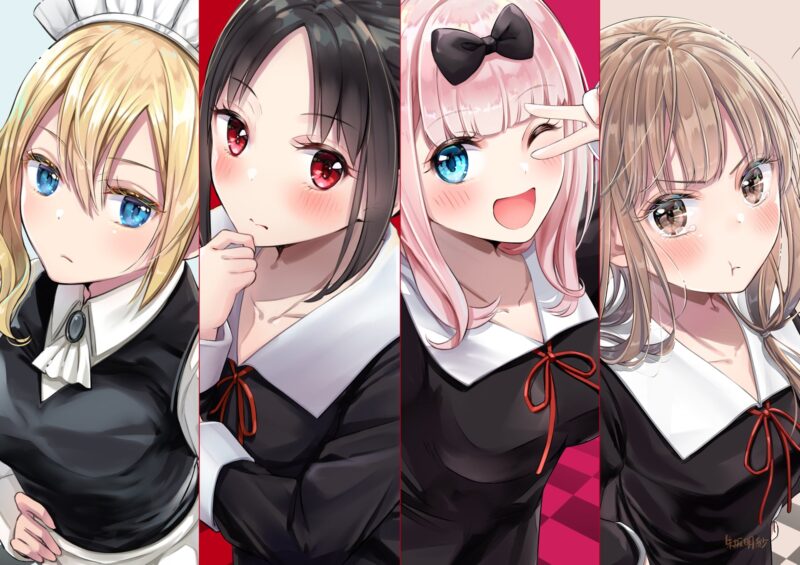
The third season ratchets this contest with an interesting twist tied to the ever-present high school culture festival trope. The changes the characters undergo in the third season–except for the chaotic Chika, anyway–ties all the way into the first episodes of the series. The references and links to the earliest episodes reminded me of how well the story was written despite its goofiness. It takes teen angst and confusion as not only a source for silliness and satirizing rom-coms but also as a source for real difficulty. It’s easy to forget as you age that what appears to be angst and immaturity are a person’s genuine effort to muddle through challenges. For example, Ishigami’s edginess and withdrawal and white knight behavior toward Ino are protective mechanisms for the hurt he sustained in the past. He has to overcome this hurt to ask out his crush Tsubame. Of course, while these difficulties are serious, they fuel the comedy! All of the comedy comes from the characters and an impressive number of layers to their personalities, situations, and interactions. Ishigami alone could be a protagonist.
Throughout the third season, Ai Hayasaka gets special attention. She struggles to connect to anyone as a normal person due to her responsibility to serve Kaguya. As Tony discusses, the manga goes into more depth about her background than the anime does. When Hayasaka encounters her mom, she reverts away from her mature, serious demeanor into a childish state. This shows how desperate she is for a regular life that she never had. This season also builds on an earlier challenge Kaguya issued to Hayasaka: for Hayasaka to seduce Shirogane into going out. This, like all the other earlier threads, is then picked up in the third season. The seriousness that underlays all the jokes and antics keeps the ridiculousness grounded while making the punchlines more charming. It works like Seinfeld. Only unlike Seinfeld’s terrible characters (let’s face it, Jerry and gang–if you’ve seen the sitcom–are terrible people) Kaguya-sama’s characters are likeable. I’ve started reading the manga, so I look forward to learning more about Hayasaka as I slowly work my way through it.
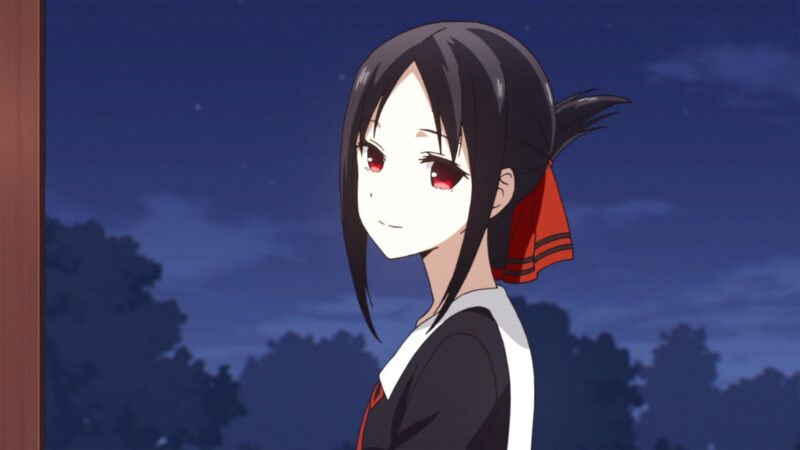
Kaguya and Shirogane’s relationship reveals interesting character development in a direction I wasn’t able to predict. Kaguya, especially, grows in interesting ways. Their relationship has mutual respect, and really is a relationship of complementary equals. It’s nice to see characters that aren’t co-dependent.
As anime rom-coms go, Kaguya-sama has a sophistication under its silliness. Again, like Seinfeld has some sophisticated, if dated, commentary behind its silliness. Kaguya-sama comments about how hard it is to connect to people as friends and as romantic partners (partners in mutual respect and feeling). Opening yourself and dropping your mask is risky and scary, but it is the only way to connect to people. You will get hurt at some point. Plus. it is hard to learn how to do it. The old script of courtship no longer applies, and social skills can only be learned through trial and lots of error. Of course, those errors are funny as an outsider! The narrator of Kaguya-sama does a good job at adding punchlines to social faux-pas everyone has done at one time or another.
Kaguya-sama manages to be funny–far funnier than the standard anime rom-com–without a bit of fan service. It proves fan service tropes are unnecessary. Okay, you could argue there is a little fan service. Kaguya cosplays a few times in the series. While this is a trope the series satirizes, it avoids skin-showing tropes; emphasizing these would not have fit with the characters’ personalities and the themes. Fan service often doesn’t care about whether it fits the story or not, but I digress.
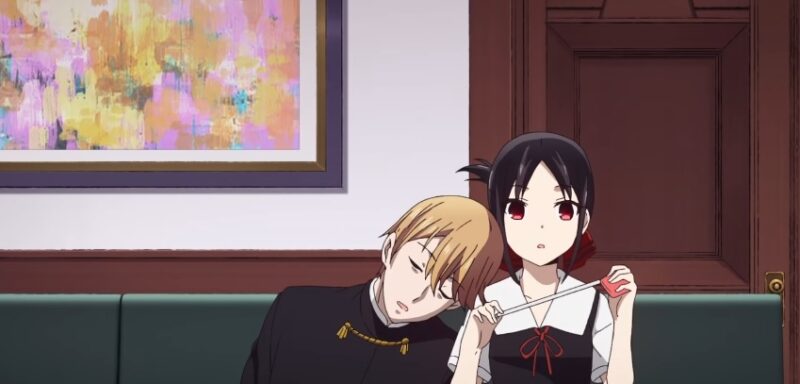
I consider Kaguya-sama as something of an Neon Genesis Evangelion for modern rom-coms. Like Evangelion deconstructed the mecha genre, Kaguya-sama deconstructs some of the romantic comedy genre and creates something different. It isn’t vastly different from the standard fare, but really Evangelion wasn’t that different from mecha of its period. Time will tell if Kaguya-sama will have a lasting influence on the romantic comedy genre. Anime has changed since Evangelion, and its harder for a single series to have as large an impact. The audience for anime is larger, and there’s much more being produced and released to the West.
It’s rare for me to enjoy a comedy as I enjoyed Kaguya-sama. Most comedies, anime or otherwise, leave me, at best, mildly amused. I laughed out loud while watching the silliness of Kaguya-sama. Its heart and well-timed jokes combined with its deconstruction of romantic comedy and the awkwardness of modern dating culture to create a compelling mix. I was pleased that it didn’t wear out its welcome and even made a few cringy “lovey-dovey” scenes into a joke. I hope Kaguya-sama sets a trend for more stories like it, goofy but with sophistication behind its writing, foregoing fan service for better jokes and endearing characters with unique and strong personalities.
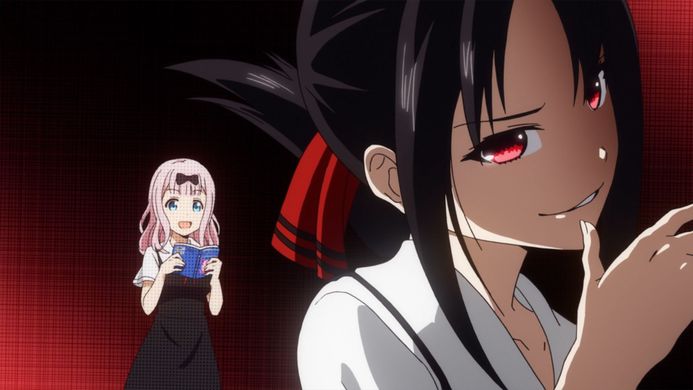
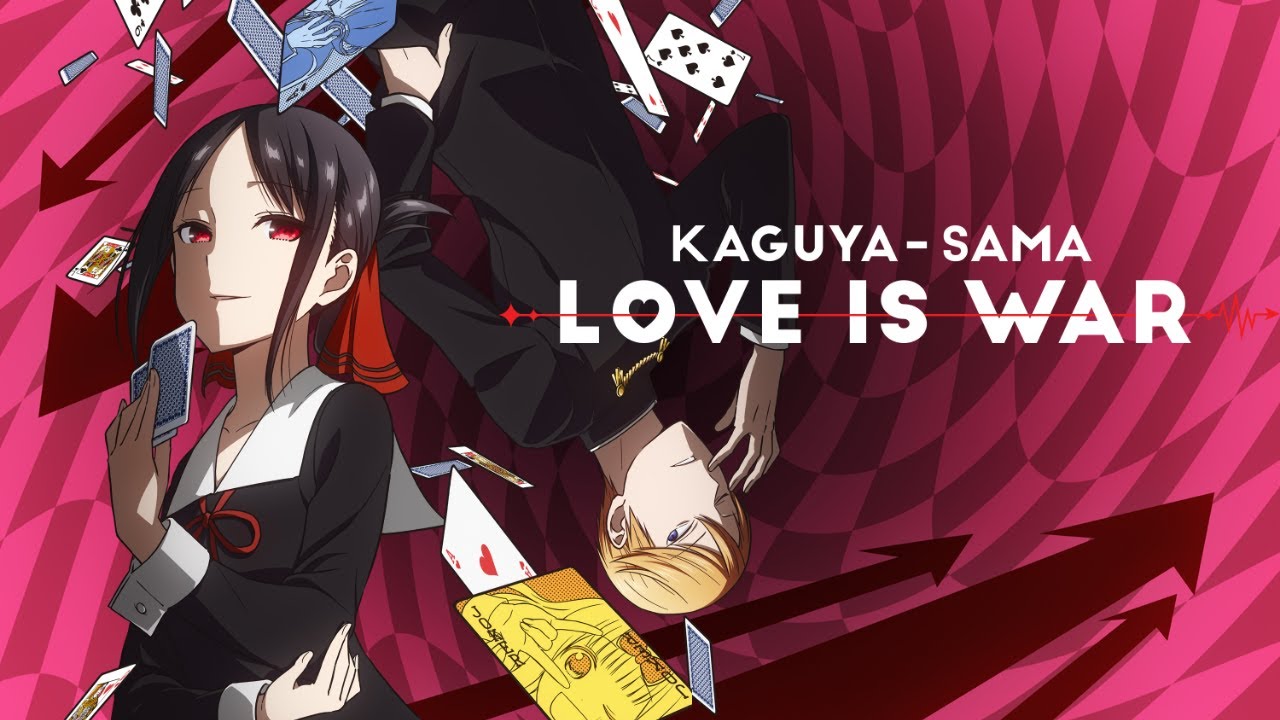

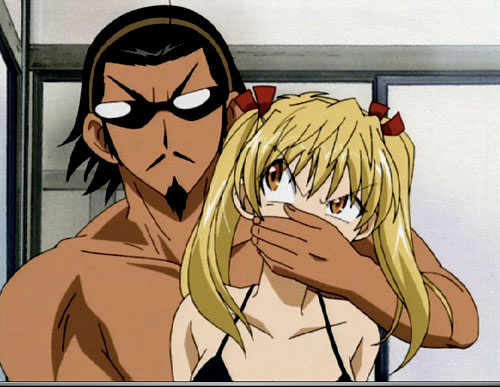
It’s funny. I just got here from your post about after-anime depression, which I google about after watching the last chapter of Kaguya-sama and suddenly feeling “sad”. And it’s also funny that you compare Kaguya-sama to Evangelion, the first anime to make me feel such empty feeling after finishing it, close to 12 years ago.
I never expected Kaguya-sama to hit this hard, but it did. It went from one of the funniest anime I have seen to a romantic story that sucked me in and got me really attached to the characters, I wanted them all to find a happy ending, and I sort of got that in the end. I just wish this feeling of emptiness wasn’t my first response to that end.
Kaguya-sama’s ending is well done. It ends on a happy note while suggesting a future of antics ahead. In many ways, the ending reminds me of Samurai Champloo. These closed, yet open endings appear often in Japanese folklore–usually with a not-so-happy ending to them.
Emotions seems to follow the law of equal and opposite reaction. The higher your emotional attachment, the stronger the low becomes when the attachment has to end. Strangely, the opposite can hold true. Low emotional attachment and lead to high emotions when the attachment ends–only this may not be on the healthy side either.
Same here😅
.
Thanks for linking my post! I love Kaguya-sama A LOT and I generally don’t like rom-coms myself. Hayasaka is my favorite female character, though I love how Ishigami is a major supporting character because in almost all rom-com series, the side male character is usually treated as a huge afterthought.
The manga is going to end in October this year, so I will miss it quite a bit.
I was also pleased to see Ishigami receive a good bit of attention. Hayasaka could carry a story on her own!
Great piece! I’ve always thought Love is War is thoughtful and clever underneath the excellent comedy. The manga is also excellent.
I’ve been enjoying the manga! The extra jokes have been good fun : )